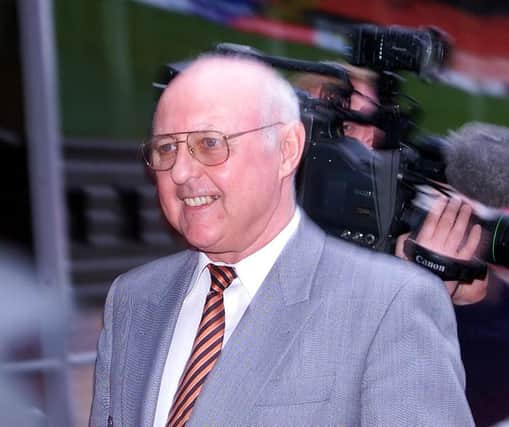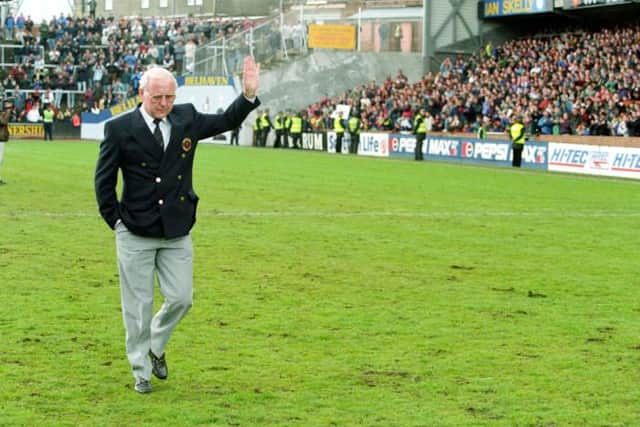'A titan of club folklore': Dundee United pay tribute to Jim McLean, 1937-2020


McLean had been living with dementia in recent times and passed away on Boxing day, aged 83.
United described the former manager, who spent more than 21 years in the Tannadice dugout and took the team to the 1984 European Cup semi-final and final of the UEFA Cup three years later, as a “titan” of the club.
Advertisement
Hide AdAdvertisement
Hide AdWhile still first-team manager he became a club director and later chairman for 12 years, leaving the position in 2000.


In a club statement United said: “He will be sorely missed by us all.”
The club paid tribute to his time at Tannadice and described McLean as “an integral part of our history and rise to the forefront of European football, Jim was simply a titan of Dundee United folklore, cherished by the United family the world over”.
The role at Tannadice was his first in management, aged 34. Previously McLean had been an inside forward with local side Larkhall Thistle, then Hamilton Academical and Clyde before he moved to Dundee in 1965, ironically making his debut in the 5-0 defeat to United. He moved on to Kilmarnock in 1968, where he joined brother Willie – it would not be the last time he encountered a family member through the rigours of Scottish football. The McLean family became famous in Scottish football circles and Jim was one of three Lanarkshire brothers involved in the game.
Dundee quirk of fate


After Ayrshire, he moved back to Dundee as a coach. But when manager John Prentice emigrated to Australia and McLean was overlooked for the management job at Dens Park, he moved across the road and replaced Jerry Kerr at United within weeks.
McLean later said: "Had they offered me the job as Dundee coach then the success in my career would have been achieved at Dens Park, not Tannadice."
His original philosophy was to produce his own young players through a youth programme, complemented with more experienced players brought in from around Scotland.
He led the club to its first ever Scottish Cup Final in 1974, and in 1979 he guided the team to its first ever major honour, the League Cup. The team retained the trophy the following year as Cup Finals became a regular occurrence.
Advertisement
Hide AdAdvertisement
Hide AdThat dominance led to the ‘New Firm’ term being coined for the emergence of United under McLean and Aberdeen during Alex Ferguson’s reign, to rival the domestic strength of Celtic and Rangers’ ‘Old Firm’.
Success in Europe
A team including David Narey, Richard Gough, Paul Sturrock and Maurice Malpas earned the highlight of his tenure at the climax of the 1982/83 season, when the team fought off challenges from Celtic and Aberdeen to win the Premier Division for the first and, so far, the only time.
That led to continental competition and, in their eulogy, United said: “Under McLean, the club became known throughout Europe, reaching the semi-finals of the European Cup in 1984, and the UEFA Cup Final in 1987.”
Impressive results, continued at that level and saw Barcelona defeated home and away, while Monaco, Borussia Monchengladbach, PSV Eindhoven, Anderlecht and Werder Bremen were also seen off during the McLean era but a contentious defeat to Roma denied him a final for the continent’s top prize against Liverpool. Three years later they were runners up as IFK Gothenburg won the UEFA Cup.
Scottish Cup and fall-outs
However despite success, McLean never landed the Scottish Cup. In his last bid for the trophy, he was beaten by Motherwell, led by his brother Tommy, in an unforgettable final at Hampden in 1991 and when United finally won the trophy in 1994, Jim had stepped back from the dugout, though remained as chairman.
While still in his role as manager, McLean was made director in 1984 and became club chairman in 1988. He retired as manager in 1993, after an incredible 21 years and seven months in the hot seat.
He fell out with his captain Malpas just before the 1994 cup final, leaving the defender to lament: "I think I went from being loved to hated, back to loved and then hated again."
Many of the relationships he held with his players ended strained as frustrations grew over the lengthy contracts he famously dished out, usually on meagre terms.
Advertisement
Hide AdAdvertisement
Hide AdBut the players' respect towards him as manager was unwavering.
"Jim McLean was always ahead of the game," said Michael O'Neill, who moved to Tannadice from Newcastle in 1987. "However, you had to withstand the abuse at times.
"I was different from a lot of the young lads at United because I'd been signed. At the time it was a record fee they paid for me and it was almost as if Jim McLean held that against me."
An unsavoury incident in 2002 when McLean attacked a BBC journalist ultimately brought an end to his association with United as he was forced to resign his boardroom post at Tannadice in the aftermath of the incident.
Flags at half-mast
But his place in United's history, and in Scottish football’s history, will not be forgotten. In addition to his Dundee United duties, he was part-time assistant manager to Jock Stein with the Scotland national team for four years, including at the 1982 World Cup.
The inaugural winner of the Scottish Football Writers' Association manager of the year award in 1987, he was inducted into the Scottish Football Hall of Fame in 2005.
United added: "In remembrance of Jim, the flags at Tannadice will fly at half-mast.”